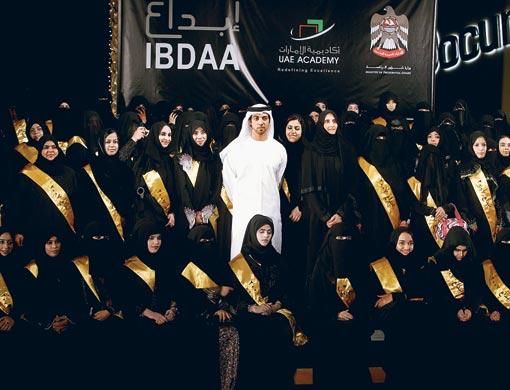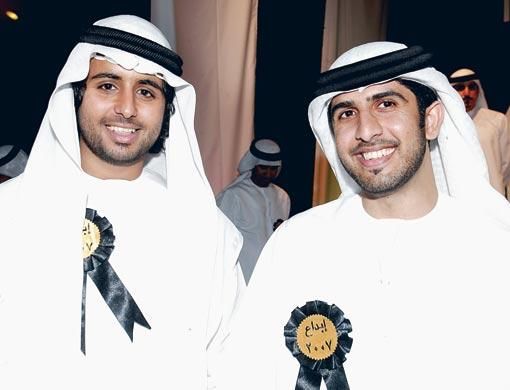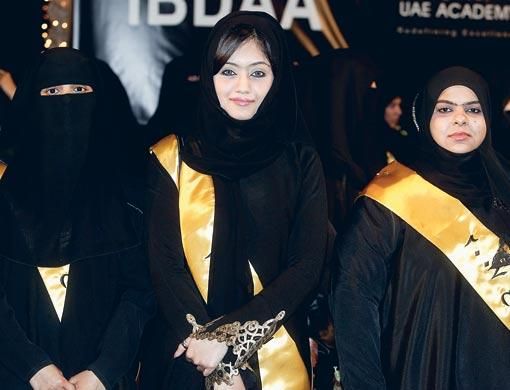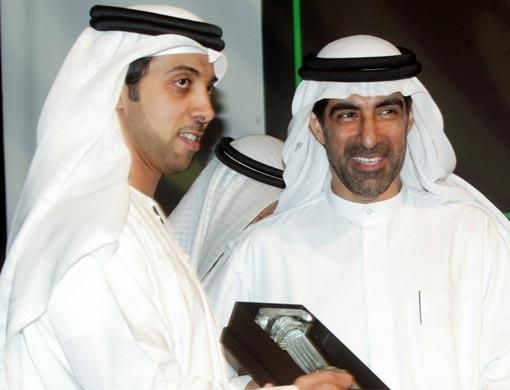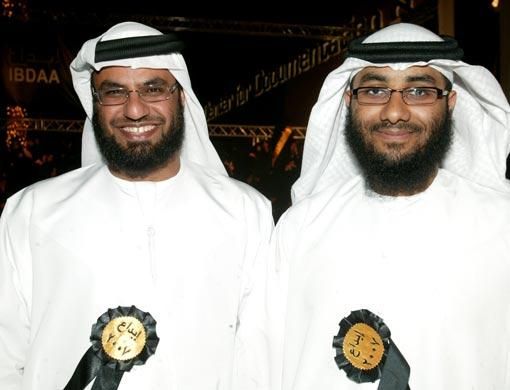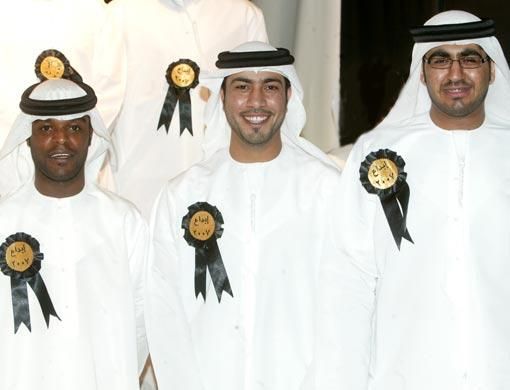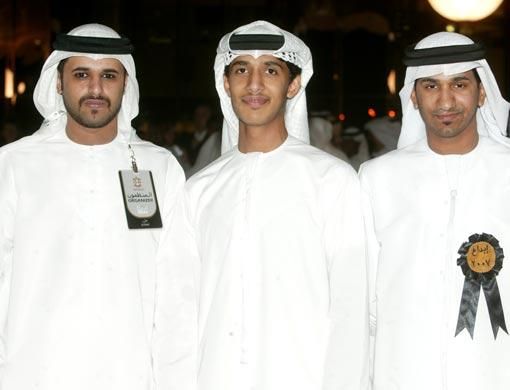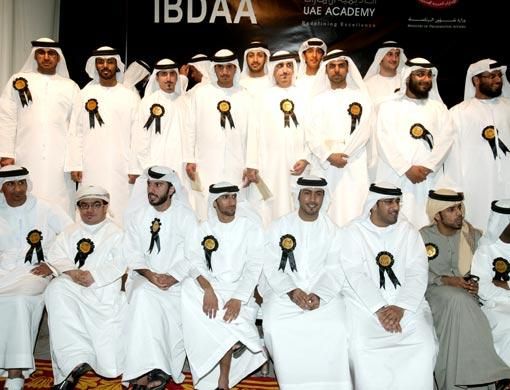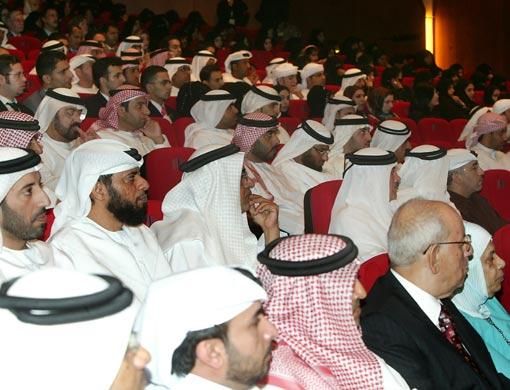Employers representing various industries were greeted by Shaikh Mansour Bin Zayed Al Nahyan, Minister of Presidential Affairs, at the Centre for Strategic and Documentation Research where over 440 UAE students, three hundred of whom were females, graduated from the IBDAA programme.
Preparing for the job market
IBDAA, supervised by the Ministry of Presidential Affairs (MPA) in co-operation with the UAE Academy, aims to prepare students between the ages of 21 and 30 to enter the job market. It also supplies private sector companies with qualified students who have the skills to meet employment requirements.
"IBDAA is an effective mechanism that creates opportunities for students and employers to provide suitable candidates in the labour market. Our job is to ensure that all our students find a job upon graduation, particularly in the private sector, which has a lower percentage of UAE nationals," said Mohammad Omar Abdullah, chairman of the UAE Academy.
Future aspirations
While the graduates took photographs at the atrium lobby and outside the building, Notes spoke to students about how they felt on their special day.
Futaim Abdullah Al Ameri, graduated from the UAE University and from IBDAA after taking courses in English speaking and listening, international computer driving licence and team leading. "My English has most definitely improved after I took the courses," said Ameri. "The teachers were from England and very highly qualified. They also helped widen my scope. I gained a lot of experience throughout my eight months of studying. I am now in the process of searching for a job and the great thing about IBDAA is that they offer opportunities in the market that best suit you."
Hassan Ali Mohammad, spent three months in IBDAA and took courses in English language, basic computer programmes (including photo shop), customer services, business and sales and leadership skills. He says he's benefited most from the English and the computer courses he took.
Yasser Omar Al Bariki, UAE University student, explained that UAE schools and universities do not focus on English or computer skills as much as they should. "They concentrate on one's major and ignore any other weaknesses or gaps that the student may be facing. IBDAA does us (UAE nationals) a favour by preparing us for the market, especially in the private sector which is more challenging for us."
Abdullah Bafaraj, took marketing, computer skills (designing) and English courses with IBDAA immediately upon graduating from the UAE University. He currently works as an inspector in the Ministry of Labour. He said that the courses, have greatly increased his confidence. "After taking just a few courses I feel a huge improvement in my abilities," said Bafaraj. "I feel that I got an opportunity to enhance my experiences and learnt that my abilities can be stretched even further.
"My next plan is to get to a higher position and take more courses, especially in design, mapping and geographical information system, which I enjoy very much."
Graduation ceremony
A video of IBDAA's objectives, was shown to the participating audience.
IBDAA graduate Abdul Aziz Mohammad Al Rumaithy said that, IBDAA had widened his scope and increased his confidence. Rumaithy, a UAE University graduate, has successfully completed courses from IBDAA in sales, business and leadership skills. He was working as a volunteer for IBDAA, as well as serving as a public notary at the Al Ain Court. As a result of his commitment and hardwork he was chosen as a speaker.
When asked his opinion on the ratio of UAE women to men in the academic field and workforce, Rumaithy explained that men are more flexible, travel easily and can work in places like the police and in offshore positions.
"Women are not as flexible and are mostly in academic and teaching fields, which explains the ratio of over 300 females among the 440 graduates," he said. "Women in general stay at home more. I am not against women working, educating and improving themselves. I believe they can perform better than men at times. I just think women should be more particular when taking up jobs."
Following the IBDAA graduation speech, gifts were presented to graduates' employers. Some of the names included Mohammad Al Dahari of the Ministry of Justice, Khalid Al Fahem of the Al Fahim Group, Rania Ebrahim of Schlumberger and Mohammad Ouda, general manager of Eisa Ouda Law Offices.
IBDAA programme duration
The programme lasts 28 weeks and is completed in three phases. The Ministry of Presidential Affairs covers the training expenses and provides a monthly payment for each trainee for phases One and Two.
Phase One
General Courses: The students have eight weeks of human resource development in:
- International Computer Driving Licence (ICDL)
- International English for Speakers of Other Languages (IESOL)
- Business Communication Skills
- Typing (Arabic and English)
- Career Guidance
- Arabic Business Writing
- Customer Care
- Creative Thinking and Problem Solving
- Team Work
- Time Management
- Presentation Skills
- Introduction to Quality Management
- Introduction to e-commerce, e-learning and e-government
Phase Two
Specialised Courses: The students and employers are given the opportunity to have 10 weeks of human resource development in courses, which are certified in various vocational business areas, such as:
- Customer Service
- Office Procedures
- Public Relations
- Personnel Support, Human Resource Management
- Travel and Tourism
- Purchasing and Supply Purchasing
- Sales and Marketing
- Occupational Safety
- Business Communication
- Quality Assurance
- Accounting
Phase Three
Internship: 10 weeks of on-the-job training.
This phase involves training by the employer. A monthly payment is given, with a final assessment based on a review of the candidate's performance conducted at the end of the 10-week phase. The assessment determines the suitability and potential of the candidate.


